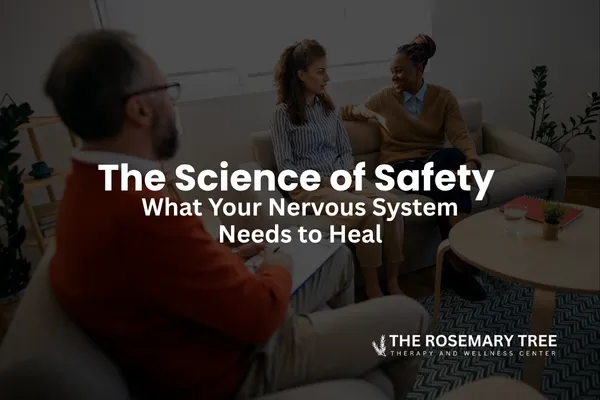
The Science of Safety: What Your Nervous System Needs to Heal
Why Safety Must Be Felt, Not Just Promised
After betrayal or deep conflict, it is common to tell yourself or your partner, “I’m safe now” or “You can trust me.” But the body may not believe it.
That is because safety is not only an idea, it is a biological experience.
When a relationship has been shaken by betrayal or secrecy, the nervous system stays on alert. It scans for signs of danger, even during calm moments. Until the body learns it is truly safe again, emotional connection will continue to feel fragile.
How the Nervous System Responds to Betrayal
When trust is broken, your body responds automatically. The brain sends out stress signals that prepare you to protect yourself, the same responses described in our Betrayal Trauma and PTSD article. (add the link)
You might notice yourself feeling tense, withdrawn, overly alert, or disconnected. These reactions are not character flaws; they are biological defenses designed to keep you safe. Healing begins when the body learns that the threat has passed and that safety can return.
Both partners can experience these responses in different ways. The betrayed partner might feel constant anxiety or vigilance. The partner who caused harm may shut down or try to rush closeness to relieve guilt.
Neither response is wrong, they are protective. But healing requires helping the nervous system understand that the threat has passed.
Why You Cannot Think Your Way Out of Trauma
Many couples try to solve relationship pain through logic and communication alone. They talk for hours but still feel stuck. That is because trauma lives in the body, not only in the mind.
When the nervous system is overwhelmed, the reasoning part of the brain, the prefrontal cortex, temporarily shuts down. In that state, words may not land and empathy may feel out of reach. The first step is not to “fix” the conversation but to calm the body.
Simple grounding practices help re-engage the thinking brain:
Breathing slowly together for 60 seconds
Noticing sensations (feet on the floor, air on the skin)
Taking breaks during heated moments to reset the body
Using gentle eye contact once both feel calm again
These actions tell the body: You are safe enough to connect.
How Couples Can Co-Regulate
Healing safety as a couple means learning to co-regulate, calming each other through presence, tone, and touch.
When one partner’s nervous system is activated, the other can help anchor them by staying grounded and compassionate. Small things make a difference: speaking softly, sitting nearby, or simply breathing together.
Co-regulation rebuilds the emotional bond that betrayal disrupted. It teaches the body that connection can once again feel safe.
Why Intensives Help the Nervous System Heal Faster
Traditional therapy allows for reflection, but deep nervous system repair requires time, continuity, and containment. In a one-hour session, couples often reach emotional depth just as time runs out, leaving the body unsettled.
Our Accelerated Deep-Work Therapy Intensives give couples extended, uninterrupted time to calm, process, and rebuild safety from the inside out.
During an intensive, couples will:
Learn how trauma affects the body and emotions
Practice grounding and co-regulation with therapist guidance
Experience safety exercises that reduce reactivity
Create a shared plan for staying regulated at home
Understand each other’s triggers with compassion instead of fear
This deeper format allows the nervous system to begin rewiring through repeated experiences of safety, trust, and empathy.
What Healing Feels Like in the Body
As your body relearns safety, you may notice changes such as:
Tension in your chest or shoulders releasing more easily
A softer tone in your voice during difficult talks
The ability to stay present even when emotions rise
Fewer panic reactions to reminders of betrayal
Sleep improving as your body relaxes again
These shifts show that healing is happening, not just emotionally, but physiologically.
Final Thoughts
The path to safety begins with understanding your body’s signals. When couples learn to listen to their nervous systems, they stop fighting each other and start fighting for calm together.
If your relationship feels stuck in survival mode, we would be honored to help. You can reach out to us here, and our team will connect with you to talk about what this process might look like. There is no pressure, only a safe space to begin finding peace again.


